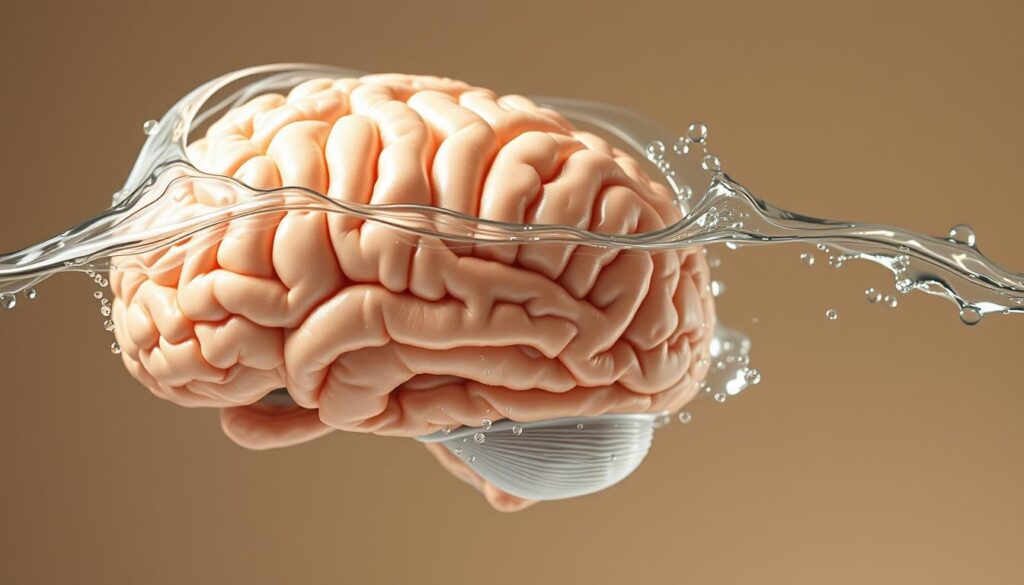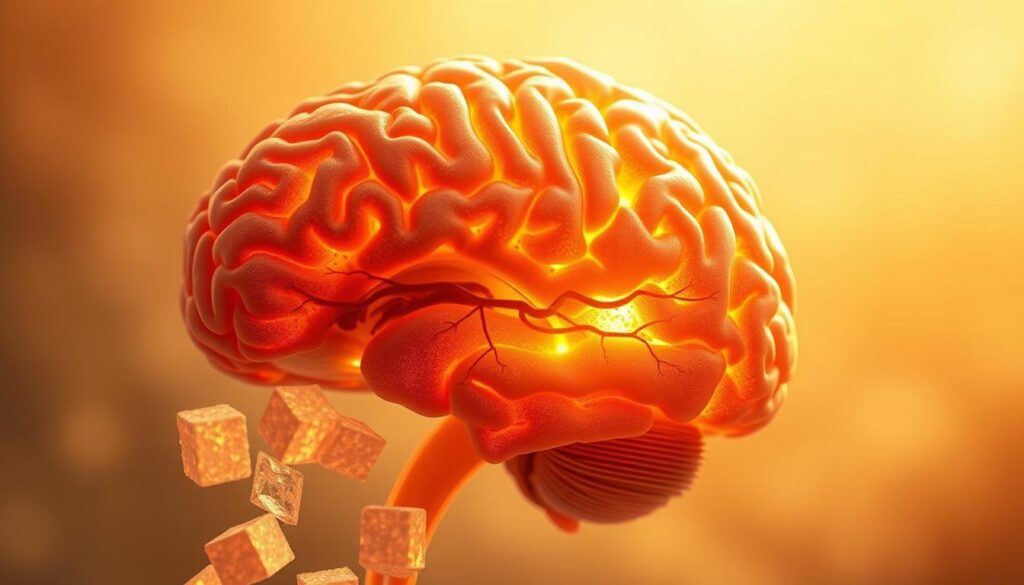Can the food we eat really impact our brain’s ability to function as we age? The answer lies in understanding the intricate relationship between diet and cognitive health.
As we grow older, maintaining cognitive function becomes crucial for independence and quality of life.
According to the World Health Organization, nutrition plays a critical role in health and development across the lifespan. The brain, being an energy intensive organ requires a variety of nutrients to function optimally. Proper diet supports brain structure enhances cognitive functions, and protects against age-related decline.
As we age, aspects of cognitive function such as memory, processing speed, and executive function tend to change. Understanding how specific nutrients and dietary patterns influence these changes is key to maintaining brain health.
Key Takeaways
- The relationship between diet and cognitive health is critical for maintaining brain function as we age.
- Nutrition plays a significant role in supporting brain health and cognitive functions.
- Specific nutrients and dietary patterns can influence cognitive decline.
- Maintaining cognitive health is essential for independence and quality of life.
- A well-balanced diet is crucial for overall brain health and wellbeing.
The Brain Nutrition Connection
Nutrition plays a pivotal role in brain health, influencing our cognitive abilities throughout life.
As we age, the mechanisms that contribute to normal aging such as oxidative stress neuro inflammation and vascular dysfunction can also contribute to the development of neurological diseases. Understanding how nutrition affects brain function is crucial for maintaining cognitive health and potentially mitigating the risk of age-related cognitive decline.
How Nutrition Affects Brain Function
The brain is a highly energetic organ, consuming a significant portion of the body’s energy expenditure.
Nutritional factors play a critical role in supporting brain function, from providing energy substrates to supplying the building blocks for neurotransmitters and maintaining the integrity of brain cells. A diet rich in essential nutrients can support brain health while nutritional deficiencies can impair cognitive function.
Research has shown that certain nutrients have a direct impact on brain function. For instance omega-3 fatty acids particularly DHA and EPA, are known to support brain cell structure and function.
Antioxidants, such as vitamins C and E, help protect the brain from oxidative stress which can damage brain cells over time. Furthermore, B vitamins, especially B6, B9, and B12, play a crucial role in synthesizing neurotransmitters and maintaining homocysteine levels, which are associated with cognitive decline when elevated.
The relationship between nutrition and brain health is complex and bidirectional notes Dr. Felice Jacka, a renowned nutrition psychiatrist. Not only can nutrition influence brain health, but the brain can also influence our nutritional choices, creating a loop that can either promote health or contribute to disease.
The Science Behind Cognitive Decline
Cognitive decline is a natural part of the aging process, but the rate and extent of this decline can be influenced by various factors, including nutrition.
The mechanisms underlying age related cognitive decline involve oxidative stress, inflammation, reduced neuroplasticity, and changes in neurotransmitter systems. Nutritional interventions can potentially slow or partially reverse some aspects of cognitive decline by addressing these underlying mechanisms.
A study published in a leading neuroscience journal found that adherence to a diet rich in fruits, vegetables, whole grains, and lean proteins was associated with a lower risk of cognitive decline in older adults. The study highlighted the importance of nutritional patterns that promote vascular health and reduce inflammation both of which are critical for maintaining cognitive function.
The connection between vascular health and cognitive function is particularly noteworthy. Vascular dysfunction can lead to reduced blood flow to the brain impairing cognitive function and increasing the risk of dementia. Nutritional factors that promote vascular health, such as omega-3 fatty acids, antioxidants, and fiber, can therefore play a crucial role in maintaining cognitive health.
In conclusion, the brain-nutrition connection is a critical area of research that holds promise for promoting healthy aging and preventing cognitive decline. By understanding how nutrition affects brain function and the mechanisms underlying cognitive decline, we can develop targeted nutritional interventions to support brain health throughout life.
Understanding Cognitive Health
As we age, understanding the changes that occur in our brain is crucial for maintaining cognitive health. The process of aging is associated with various changes in the brain that can impact cognitive function. These changes are not just limited to the structure of the brain but also affect its function and plasticity.
Key Components of Cognitive Function
Cognitive function encompasses several key components, including memory, attention, processing speed, and executive functions. Memory refers to the ability to encode, store, and retrieve information. Attention is the capacity to selectively concentrate on one aspect of the environment while ignoring other elements.
Processing speed refers to the time it takes to perform mental tasks, and executive functions include high-level processes such as planning, decision-making, and problem-solving. These components work together to enable us to perform daily tasks and interact with our environment effectively.
- Memory: The ability to encode, store, and retrieve information.
- Attention: The capacity to focus on specific stimuli or tasks.
- Processing Speed: The rate at which we can perform mental tasks.
- Executive Functions: High-level processes like planning and decision-making.
How Aging Affects the Brain
Aging is associated with significant changes in brain morphology, plasticity, and function. Normal aging involves a range of alterations, including reduced brain volume changes in white matter integrity, and decreased neurotransmitter production. These changes can lead to variations in cognitive performance such as slowed processing speed and reduced working memory capacity.
The concept of neuroplasticity the brain’s ability to form new neural connections is crucial for understanding how the brain adapts and changes throughout life. While the capacity for neuroplasticity may change with age, it persists throughout the lifespan, allowing for continued learning and adaptation.
Individual differences in genetics lifestyle, and environmental factors contribute to the wide variability observed in cognitive aging trajectories. Factors such as nutrition physical activity, and social engagement can influence cognitive health and potentially mitigate some of the age-related changes.
Understanding these aspects is essential for developing strategies to support cognitive health in older adults and for identifying interventions that can help maintain brain function as we age.
Macronutrients and Brain Health
Understanding the impact of macronutrients on brain function is essential for cognitive well-being. Macronutrients, comprising carbohydrates, proteins, and fats, serve as the primary energy sources for the body and play distinct roles in maintaining brain health.
The brain is a complex organ with diverse nutritional needs. Among these, macronutrients are crucial for providing energy and supporting structural integrity. A well-balanced diet that includes the right proportions of these macronutrients is vital for maintaining optimal brain function and overall health.
Proteins: Building Blocks for Neurotransmitters
Proteins are fundamental to the structure and function of brain cells. They are composed of amino acids some of which are precursors to neurotransmitters the chemical messengers that facilitate communication between neurons.
For instance, the amino acid tyrosine is a precursor to dopamine and norepinephrine, neurotransmitters that play significant roles in attention and arousal. Consuming adequate protein is thus essential for maintaining the balance of these neurotransmitters and supporting cognitive function.
A study highlighted in a review by experts in nutrition and neuroscience underscores the importance of proteins in synthesizing neurotransmitters thereby influencing mood cognition, and overall brain activity.
Including a variety of protein sources in one’s diet, such as lean meats, fish, eggs, and plant-based options like legumes and nuts can help ensure that the brain has the necessary building blocks for optimal function.
Fats: Essential for Brain Structure and Function
Fats are another critical macronutrient for brain health, constituting a significant portion of brain tissue. Certain fats, particularly omega-3 fatty acids, are known to support brain function and have been associated with improved cognitive performance.
These essential fatty acids cannot be produced by the body and must be obtained through the diet. Foods rich in omega-3s, such as fatty fish, flaxseeds, and walnuts, are thus considered beneficial for the brain.
The structural integrity of brain cells and the integrity of the blood-brain barrier are partly maintained by the incorporation of dietary fats into cell membranes. A diet that includes healthy fats can support these processes, potentially mitigating some effects of aging on the brain.
The quality of dietary fat intake is a critical determinant of brain function and health.
Carbohydrates Fuel for Brain Energy
Carbohydrates are the brain’s primary source of energy, with glucose being the preferred fuel. The brain consumes a disproportionate amount of glucose relative to its size underscoring the importance of a steady supply of carbohydrates for maintaining brain function.
The type and quality of carbohydrates consumed can significantly impact blood glucose levels and, by extension, cognitive performance.
Complex carbohydrates, such as those found in whole grains vegetables, and legumes, provide a more stable source of glucose compared to refined carbohydrates which can cause spikes and crashes in blood sugar levels. A diet rich in complex carbohydrates can support stable energy supply to the brain, promoting better cognitive function and long-term health.
Research has shown that glycemic control and insulin sensitivity are closely linked to cognitive health with insulin resistance and type 2 diabetes being risk factors for cognitive decline. Therefore, choosing whole grains and other complex carbohydrate sources is a practical strategy for supporting brain health through dietary choices.
Essential Micronutrients for Cognitive Function
The role of micronutrients in supporting brain health cannot be overstated. As we age, our cognitive function can decline, but a diet rich in essential micronutrients can help mitigate this decline. In this section, we will explore the critical micronutrients that support cognitive function.
B Vitamins and Brain Health
B vitamins are known to play a significant role in maintaining brain health. They are involved in various processes that support cognitive function, including neurotransmitter synthesis and energy production. Vitamin B6, B9 folate and B12 are particularly important, as deficiencies in these vitamins have been linked to cognitive decline and an increased risk of dementia.
A study published in the Journal of Alzheimer’s Disease found that higher intake of B vitamins was associated with improved cognitive function in older adults
Higher total intakes of B6, B9, and B12 were associated with better cognitive performance in older adults.
. Foods rich in B vitamins include lean meats, fish, eggs, dairy products, and fortified cereals.
| B Vitamin | Food Sources | Cognitive Benefits |
|---|---|---|
| Vitamin B6 | Chicken, fish, potatoes, bananas | Neurotransmitter synthesis |
| Vitamin B9 Folate | Leafy greens, legumes, fortified cereals | Homocysteine regulation |
| Vitamin B12 | Meat, fish, poultry, dairy products | Neurotransmitter synthesis, myelin maintenance |
Antioxidants: Vitamins C, E, and Beta-Carotene
Antioxidants, including vitamins C, E, and beta-carotene, protect the brain from oxidative stress, which can damage brain cells and contribute to cognitive decline. Vitamin C is found in high concentrations in fruits and vegetables, while vitamin E is abundant in nuts and seeds. Beta-carotene, a precursor to vitamin A, is found in orange and yellow vegetables.
A diet rich in antioxidants can help protect against cognitive decline. Research has shown that higher intake of antioxidant vitamins is associated with a lower risk of dementia and Alzheimer’s disease.
Vitamin D and Cognitive Protection
Vitamin D has been recognized for its role in maintaining bone health, but it also plays a significant role in brain health. Vitamin D receptors are present in areas of the brain involved in learning and memory, suggesting its importance in cognitive function.
Studies have found that vitamin D deficiency is associated with an increased risk of cognitive decline and dementia. Maintaining adequate vitamin D levels through sun exposure, diet, or supplementation is crucial for cognitive health.
Minerals Iron Magnesium and Zinc
Minerals such as iron, magnesium, and zinc are crucial for maintaining healthy brain function. Iron is essential for transporting oxygen to the brain, while magnesium is involved in over 300 enzymatic reactions that support neuronal function. Zinc plays a critical role in synaptic plasticity and learning.
Both deficiency and excess of these minerals can impair cognitive function. For example, iron deficiency anemia is associated with poor cognitive development in children, while iron overload can lead to oxidative stress and neuronal damage.
- Iron: Essential for oxygen transport and neurotransmitter synthesis.
- Magnesium: Involved in neuronal function and synaptic plasticity.
- Zinc: Crucial for synaptic plasticity and learning.
In conclusion, a balanced intake of essential micronutrients is vital for maintaining cognitive function and overall brain health. Ensuring adequate intake of B vitamins, antioxidants, vitamin D, and minerals like iron, magnesium, and zinc can help support cognitive health throughout life.
Omega-3 Fatty Acids Brain’s Best Friend
Maintaining adequate levels of omega-3 fatty acids is essential for supporting cognitive function and overall brain health. Omega-3s are a group of polyunsaturated fats that are crucial for various bodily functions, including the structure and function of the brain.
DHA and EPA Critical Components for Brain Cells
Omega-3 fatty acids, particularly DHA docosahexaenoic acid and EPA eicosapentaenoic acid play a vital role in brain health.
DHA is a major structural component of the brain, contributing to the integrity of brain cells and facilitating neural communication. EPA on the other hand, supports brain health by promoting an anti-inflammatory environment, which is crucial for maintaining cognitive function.
The combined effects of DHA and EPA have been shown to support cognitive health, potentially reducing the risk of cognitive decline associated with aging. Research has highlighted the importance of these fatty acids in maintaining healthy brain function and their potential role in mitigating neurodegenerative diseases.
Key Functions of DHA and EPA:
- Supporting brain cell structure and function
- Facilitating neural communication
- Promoting an anti-inflammatory environment
- Contributing to overall cognitive health
Best Sources and Recommended Intake
Omega-3 fatty acids can be obtained from various dietary sources. Fatty fish like salmon, sardines, and mackerel are rich in DHA and EPA. For those following a vegetarian or vegan diet, plant-based sources such as walnuts flaxseeds and chia seeds provide ALA alpha linolenic acid a precursor to DHA and EPA.
However, the conversion of ALA to DHA and EPA in the human body is limited, making it essential for vegetarians and vegans to consider alternative sources or supplements.
The recommended intake of omega-3s varies, but a general guideline is to consume fatty fish at least twice a week. For individuals who do not consume fish, supplements or fortified foods can be a viable option. It’s essential to choose high-quality supplements that are rich in DHA and EPA and have been tested for purity and potency.
Recommended Sources:
- Fatty fish salmon, sardines, mackerel
- Plant-based sources walnuts, flaxseeds, chia seeds
- Omega-3 supplements ensure they are rich in DHA and EPA
- Fortified foods certain yogurts, eggs, and milk
By incorporating these sources into your diet and being mindful of your omega-3 intake, you can support your brain health and potentially reduce the risk of cognitive decline.
Nutrition and Cognition Keeping Your Brain Sharp as You Age
Nutrition plays a pivotal role in supporting brain health throughout life, from early development to old age. The intricate relationship between diet and cognitive function underscores the importance of making informed nutritional choices to maintain brain health.
How Dietary Choices Impact Cognitive Decline
Dietary choices significantly influence cognitive decline, with certain nutrients playing critical roles in maintaining brain function.
B vitamins, for instance, are essential for brain development and function, with vitamin B12 being particularly important for neural myelination and overall brain health. Research has shown that adequate intake of B vitamins especially during pregnancy and early childhood is crucial for optimal cognitive development.
A key aspect of dietary influence on cognitive decline is the consumption of nutrients that support brain health. Omega-3 fatty acids, particularly DHA and EPA, are known to be critical for brain structure and function. Studies have highlighted the importance of these nutrients in supporting cognitive health, especially in older adults.
- Essential nutrients like B vitamins and omega-3 fatty acids play a significant role in maintaining cognitive function.
- A diet rich in fruits, vegetables, and whole grains supports overall brain health.
- Nutritional choices made early in life can have long-term effects on cognitive health.

Nutritional Strategies for Different Life Stages
Nutritional needs for cognitive health evolve across the lifespan. During pregnancy and early childhood, certain nutrients are crucial for brain development. For example, choline is important for fetal brain development, while iron is critical during infancy for healthy brain growth.
In adolescence and adulthood, a balanced diet that includes a variety of nutrients supports overall brain health.
As people age into older adulthood, physiological changes such as reduced absorption and altered metabolism affect nutritional needs. Older adults may require more of certain nutrients, like vitamin D and omega-3 fatty acids, to support cognitive health.
- Focus on nutrient-dense foods during pregnancy and early childhood.
- Maintain a balanced diet throughout adulthood to support brain health.
- Adjust nutritional strategies in older age to account for physiological changes.
By understanding the nutritional needs at different life stages and making informed dietary choices, individuals can support their brain health and potentially reduce the risk of cognitive decline.
The Mediterranean Diet for Brain Health
Studies have demonstrated that the Mediterranean diet is not only beneficial for cardiovascular health but also plays a significant role in maintaining cognitive function as we age.
The Mediterranean diet rich in fruits, vegetables, whole grains and healthy fats has been extensively studied for its potential to support brain health and reduce the risk of cognitive decline.
Key Components and Benefits
The Mediterranean diet is characterized by high consumption of monounsaturated fats, such as those found in olive oil, and a high intake of fruits, vegetables legumes, and whole grains.
It also includes moderate consumption of fish, poultry, and dairy products, with lower consumption of red meat and processed foods. This dietary pattern has been associated with numerous health benefits, including a reduced risk of heart disease, type 2 diabetes, and certain cancers.
Key Components:
- High intake of fruits and vegetables
- Use of olive oil as the primary source of fat
- High consumption of whole grains and legumes
- Moderate consumption of fish, poultry, and dairy products
- Low consumption of red meat and processed foods
The Mediterranean diet’s benefits for brain health are thought to be due to its high levels of antioxidants, anti-inflammatory compounds, and healthy fats, which support brain function and may help protect against age-related cognitive decline.
Research Supporting Cognitive Protection
A substantial body of research supports the Mediterranean diet’s role in cognitive protection. Observational studies, clinical trials, and meta-analyses have all contributed to our understanding of how this dietary pattern affects brain health.
One landmark study, PREDIMED, demonstrated the cognitive benefits of a Mediterranean diet intervention. Participants who followed a Mediterranean diet supplemented with extra virgin olive oil or nuts showed improved cognitive function over a four-year period compared to those on a control diet.
| Study | Outcome | Duration |
|---|---|---|
| PREDIMED | Improved cognitive function | 4 years |
| Three-City Study | Reduced risk of dementia | Longitudinal |
| Meta-analysis | Moderate protective effect against cognitive decline | Varies |
The evidence suggests that greater adherence to the Mediterranean diet is associated with greater protection against cognitive decline.
Research has also explored the diet’s effects on specific cognitive domains, such as memory executive function, and processing speed as well as its impact on biomarkers of brain health like hippocampal volume and white matter integrity.
In conclusion, the Mediterranean diet offers a promising dietary approach to supporting brain health and reducing the risk of cognitive decline. Its key components, including high intake of fruits, vegetables, and healthy fats, contribute to its beneficial effects on cognition.
Other Brain-Boosting Dietary Patterns
Emerging evidence suggests that multiple dietary approaches can support brain health, offering alternatives to the Mediterranean Diet. While the Mediterranean Diet has been extensively studied and recognized for its cognitive benefits, other eating patterns also show promise in enhancing cognitive function and overall brain health.
The MIND Diet: Designed for Brain Health
The MIND Diet, or Mediterranean-DASH Intervention for Neurodegenerative Delay, is a dietary pattern specifically designed to combat cognitive decline. It combines elements of the Mediterranean Diet and the DASH Diet focusing on foods that are known to support brain health.
The MIND Diet emphasizes the consumption of leafy greens, berries, nuts, beans, whole grains, fish, poultry, olive oil, and wine in moderation. Research has shown that adherence to the MIND Diet is associated with a reduced risk of Alzheimer’s disease and slower cognitive decline.
A key aspect of the MIND Diet is its simplicity and flexibility. It does not require strict adherence to a particular dietary pattern but rather encourages the inclusion of brain-healthy foods. The diet recommends at least three servings of whole grains, a salad, and one other vegetable daily, along with a glass of wine. The emphasis on whole, nutrient-dense foods makes it a sustainable choice for long-term brain health.
The Nordic Diet and DASH Diet: Benefits for Cognition
The Nordic Diet, inspired by the traditional foods of Scandinavian countries, focuses on locally sourced, seasonal, and sustainable foods. It includes a high intake of whole grains like rye, barley, and oats, along with berries, fatty fish, root vegetables, and canola oil.
A 4-year study involving 1,140 men and women with normal cognition found that adherence to the Nordic Diet was associated with enhanced cognitive functioning compared to baseline.
The DASH Diet, primarily designed to combat hypertension, has also been found to have cognitive benefits. It emphasizes fruits, vegetables, low-fat dairy, whole grains, lean proteins, and reduced sodium. The DASH Diet’s cardiovascular benefits are believed to translate into brain protection, as cardiovascular health is closely linked to cognitive function.
| Dietary Pattern | Key Components | Cognitive Benefits |
|---|---|---|
| MIND Diet | Leafy greens, berries, nuts, beans, whole grains, fish, poultry, olive oil | Reduced risk of Alzheimer’s, slower cognitive decline |
| Nordic Diet | Whole grains, berries, fatty fish, root vegetables, canola oil | Enhanced cognitive functioning |
| DASH Diet | Fruits, vegetables, low-fat dairy, whole grains, lean proteins, reduced sodium | Cardiovascular benefits translating to brain protection |
Comparing these dietary patterns reveals common principles, such as an emphasis on whole foods, plants, and healthy fats. While cultural and regional adaptations exist, these diets offer diverse approaches to supporting brain health. Incorporating elements from these diets can provide a comprehensive strategy for maintaining cognitive function and overall well-being.
The way we eat has a significant impact on our brain health, and adopting dietary patterns that emphasize whole, nutrient-dense foods can be a crucial step in maintaining cognitive function as we age.
Hydration and Brain Function
Proper hydration is fundamental to maintaining healthy cognitive processes. Even mild dehydration can have significant effects on the brain, impacting concentration, memory, and mood. As we age, maintaining optimal hydration becomes increasingly important for supporting brain health.
How Dehydration Affects Cognitive Performance
Dehydration, even at mild levels, can significantly impair cognitive performance. Research has shown that dehydration can affect attention, memory, and motor skills, making everyday tasks more challenging. The brain is highly sensitive to changes in hydration status, and even slight dehydration can lead to difficulties in concentration and decision-making.
Studies have demonstrated that dehydration can result in decreased cognitive performance, particularly in tasks that require attention and memory. The effects of dehydration on cognitive function can be observed even before physical symptoms become apparent, highlighting the importance of maintaining adequate hydration levels throughout the day.
Optimal Hydration Strategies
Maintaining optimal hydration requires a combination of adequate fluid intake and awareness of individual hydration needs. The general recommendation is to drink at least eight 8-ounce glasses of water daily, but this can vary based on factors such as age, sex, activity level, and climate.
Older adults are particularly at risk for dehydration due to decreased thirst sensation and changes in the body’s ability to regulate fluids. It’s essential for older adults to drink water regularly throughout the day, even if they don’t feel thirsty. Monitoring urine color, with the aim of maintaining a pale yellow color, can be a simple and effective way to gauge hydration status.
Beyond plain water, other beverages and foods can contribute to daily hydration needs. Hydrating foods such as fruits, vegetables, and soups can provide significant amounts of water, while herbal teas and other low-caffeine beverages can also contribute to fluid intake. However, it’s essential to be mindful of the potential diuretic effects of caffeine and alcohol, which can negatively impact hydration status.

In conclusion, maintaining proper hydration is crucial for supporting brain health and cognitive function. By understanding the effects of dehydration and implementing optimal hydration strategies, individuals can take proactive steps to protect their cognitive health as they age.
The Gut Brain Connection
Emerging research highlights the critical role of the gut-brain axis in influencing our brain function and overall well-being. The gut and the brain are connected through the gut-brain axis, a bidirectional communication network that involves the central nervous system, the enteric nervous system, and the vagus nerve.
This complex communication network enables the exchange of information between the gut and the brain, influencing various physiological processes, including digestive health, immune function, and even cognitive health.
Recent studies have shown that alterations in the gut microbiota are associated with various neurological disorders, including neurodegenerative diseases such as Alzheimer’s and Parkinson’s.
The Microbiota-Gut-Brain Axis
The microbiota-gut-brain axis plays a crucial role in maintaining brain health. The gut microbiota produces various metabolites, such as short-chain fatty acids, that can influence brain function and behavior. For instance, certain metabolites can modulate the production of neurotransmitters, such as serotonin and dopamine, which are essential for regulating mood and cognitive processes.
Research has also shown that changes in the gut microbiota can affect the stress response, with some studies indicating that an imbalance in the gut microbiota can lead to increased stress and anxiety-like behaviors. Understanding the mechanisms underlying the microbiota-gut-brain axis is crucial for developing novel therapeutic strategies for neurological disorders.
Probiotics and Prebiotics for Cognitive Health
Probiotics, live beneficial microorganisms, and prebiotics, non-digestible food components that promote the growth of beneficial microorganisms, have been shown to have a positive impact on cognitive health. Certain probiotic strains have been found to improve cognitive function, reduce stress, and enhance mood.
The mechanisms underlying the effects of probiotics and prebiotics on brain function involve the modulation of inflammation, production of beneficial metabolites, enhancement of gut barrier integrity, and effects on neurotransmitter systems.
For example some probiotics can produce neurotransmitters, such as GABA and serotonin, which play a crucial role in regulating mood and cognitive processes.
When selecting probiotic supplements, it’s essential to consider the strain-specific effects, as different bacterial strains may have different effects on brain function. Additionally, incorporating prebiotic-rich foods, such as asparagus, bananas, and onions, into one’s diet can help support the growth of beneficial microorganisms.
In conclusion, the gut-brain connection is a complex and bidirectional communication network that plays a critical role in maintaining cognitive health and overall well-being. By understanding the mechanisms underlying this connection and incorporating probiotics and prebiotics into our diet, we can potentially support brain health and reduce the risk of neurological disorders.
Anti-Inflammatory Foods and Brain Protection
As we age, incorporating anti-inflammatory foods into our diet can be a key strategy for preserving cognitive function. Chronic inflammation is a known risk factor for various neurodegenerative diseases, and certain dietary choices can significantly impact this process.
The Impact of Chronic Inflammation
Chronic inflammation has been linked to cognitive decline and an increased risk of neurodegenerative diseases such as Alzheimer’s and Parkinson’s. The mechanisms behind this involve complex interactions between immune cells, cytokines, and the brain, leading to neuronal damage and dysfunction.
Reducing chronic inflammation through dietary interventions is a promising strategy for mitigating cognitive decline. Foods rich in antioxidants and polyphenols have been shown to exert anti-inflammatory effects, potentially protecting the brain.
The anti-inflammatory diet is not just about avoiding certain foods, but also about incorporating a variety of nutrient-dense foods that promote overall health and well-being.
Top Anti-Inflammatory Foods for Brain Health
Several foods have been identified as having potent anti-inflammatory properties beneficial for brain health. These include:
- Fatty fish like salmon, rich in omega-3 fatty acids
- Colorful fruits and vegetables, high in polyphenols and antioxidants
- Nuts and seeds, rich in vitamin E and healthy fats
- Olive oil, containing oleocanthal and other polyphenols
- Turmeric, with its active compound curcumin
These foods work through various mechanisms to reduce inflammation, including inhibiting inflammatory signaling pathways and modulating immune function.
| Food | Key Compound | Anti-Inflammatory Effect |
|---|---|---|
| Fatty Fish | Omega-3s | Reduces cytokine production |
| Turmeric | Curcumin | Inhibits inflammatory pathways |
| Olive Oil | Oleocanthal | Suppresses inflammatory enzymes |
Incorporating these foods into one’s diet can be straightforward. For example, adding turmeric to curries or using olive oil in salad dressings can be simple yet effective ways to boost anti-inflammatory intake.
Practical tips for incorporating anti-inflammatory foods include starting the day with a breakfast rich in fruits and nuts, using olive oil for cooking, and including fatty fish in meals a few times a week.
Foods to Limit for Better Brain Health
Maintaining a healthy brain requires attention to the foods we consume and their impact on cognitive function. As we age, certain dietary choices can significantly influence our brain health, either positively or negatively. In this section, we will explore the types of foods that are best limited or avoided to support better brain health.
Saturated Fats and Processed Foods
Consuming high amounts of saturated fats and processed foods has been linked to impaired brain function and an increased risk of cognitive decline.
A diet rich in saturated fats can stimulate the hippocampus to produce a neuro-inflammatory response leading to memory deficits. Furthermore a high intake of processed foods often correlates with a higher risk of obesity, diabetes, and Alzheimer’s disease.
A review by Francis and Stevenson highlighted the association between a diet high in saturated fats and refined carbohydrates and impaired cognitive function. The consumption of such a diet not only affects brain health directly but also contributes to various metabolic disorders that are risk factors for Alzheimer’s disease.
| Food Type | Impact on Brain Health | Recommended Action |
|---|---|---|
| Saturated Fats | Increases neuro-inflammation, impairs cognitive function | Limit intake of red meat, full-fat dairy products |
| Processed Foods | Contributes to obesity, diabetes, cognitive decline | Avoid packaged snacks, processed meats |
Sugar and Refined Carbohydrates
Excessive consumption of sugar and refined carbohydrates can negatively impact brain health through multiple mechanisms. High sugar intake is associated with blood glucose dysregulation, glycation of proteins, and increased inflammation, all of which can impair cognitive function.
The concept of type 3 diabetes has been proposed to describe the link between insulin resistance in the brain and Alzheimer’s disease. Diets high in sugar may contribute to this condition by promoting insulin resistance and impairing glucose metabolism.
Research has shown that high sugar consumption is linked to reduced hippocampal volume, poorer memory performance, and an increased risk of dementia. Moreover, sugar affects reward pathways in the brain, potentially leading to addictive-like eating patterns.

To mitigate these effects, it is essential to reduce sugar and refined carbohydrate intake. Strategies include identifying hidden sugars in foods, opting for healthier substitutes to satisfy sweet cravings, and gradually retraining taste preferences toward less sweetness.
By being mindful of the foods we consume and limiting those that are detrimental to brain health, we can take proactive steps toward maintaining cognitive function and reducing the risk of neurological disorders.
Creating a Brain Healthy Meal Plan
Developing a brain-healthy meal plan is crucial for maintaining cognitive function throughout life. According to the World Health Organization WHO balanced nutrition is essential for physical and mental wellbeing across the entire lifespan. A well-structured meal plan can significantly impact brain health by providing the necessary nutrients for optimal cognitive function.
Daily Nutritional Needs
To support brain health, it’s essential to understand the daily nutritional requirements. The brain relies heavily on a balanced intake of macronutrients and micronutrients. Proteins are vital for building and repairing brain tissues while fats, particularly omega-3 fatty acids are crucial for brain cell structure and function.
Carbohydrates serve as the primary fuel for the brain. Additionally, vitamins and minerals such as B vitamins, vitamin D, and minerals like iron, magnesium, and zinc play significant roles in cognitive processes.
Sample Meal Plans
Creating a brain-healthy meal plan involves incorporating foods rich in essential nutrients. Here’s a sample daily meal plan:
- Breakfast: Oatmeal with berries and walnuts
- Lunch: Grilled salmon with quinoa and steamed vegetables
- Dinner: Chicken stir-fry with brown rice and a variety of colorful vegetables
These meals provide a balance of macronutrients and micronutrients necessary for brain health.
Practical Implementation Tips
Implementing a brain-healthy meal plan requires practical strategies. Start by making small, sustainable changes to your diet. Tips include:
- Smart grocery shopping by focusing on whole foods
- Reading food labels to avoid processed foods
- Meal planning to ensure balanced nutrition
- Cooking techniques that preserve nutrients, such as steaming
As the WHO guidelines emphasize, nutrition is critical for health and development. By adopting these strategies, individuals can maintain a brain-healthy diet even in challenging situations like dining out or traveling.
When adapting dietary recommendations for special circumstances such as food allergies or medical conditions, it’s crucial to seek professional guidance. For instance, individuals with gluten intolerance can substitute gluten-containing grains with gluten-free alternatives. Similarly, those with diabetes need to manage their carbohydrate intake carefully.
The right diet can significantly impact cognitive health and overall wellbeing.
By following these guidelines and tips, individuals can create a brain-healthy meal plan that supports cognitive function and overall health throughout their life.
Beyond Nutrition Lifestyle Factors for Cognitive Health
While nutrition plays a crucial role in maintaining cognitive function, other lifestyle factors are equally important for overall brain health. As we age, it’s essential to consider how different aspects of our lifestyle contribute to our cognitive well-being.
Physical Activity and Brain Function
Regular physical activity is not only beneficial for the body but also has a significant impact on brain health. Exercise has been shown to improve cognitive function, promote neuroplasticity, and even encourage the growth of new neurons.
The mechanisms behind this are complex, involving increased blood flow to the brain, reduced inflammation, and the release of various growth factors that support neuronal health.
Physical Activity Benefits for the Brain:
- Enhanced cognitive function and neuroplasticity
- Increased blood flow and oxygenation to the brain
- Reduced inflammation and oxidative stress
- Release of neurotrophic factors supporting neuronal health
Sleep, Stress Management, and Social Engagement
Sleep, stress management, and social engagement are critical lifestyle factors that significantly impact cognitive health. Adequate sleep is essential for memory consolidation, clearance of metabolic waste from the brain, and regulation of neurotransmitters and hormones that affect cognition.
The Impact of Sleep on Cognitive Health:
| Sleep Aspect | Cognitive Impact |
|---|---|
| Memory Consolidation | Enhances memory recall and learning |
| Clearance of Metabolic Waste | Reduces risk of neurodegenerative diseases |
| Regulation of Neurotransmitters | Supports mood regulation and cognitive function |
Chronic stress, on the other hand, can negatively impact brain structure and function through mechanisms like elevated cortisol levels, inflammation, and reduced neuroplasticity. Effective stress management techniques, such as meditation and mindfulness, can help mitigate these effects.
Social engagement is also vital for cognitive health. Research has shown that individuals with strong social connections tend to experience slower cognitive decline and have a lower risk of dementia. Engaging in social activities, maintaining relationships, and participating in community events can all contribute to better cognitive health.
Practical Strategies for Cognitive Health:
- Improve sleep quality through consistent sleep schedules and a relaxing bedtime routine
- Manage stress effectively with techniques like meditation, yoga, or deep breathing exercises
- Stay socially engaged through community activities, volunteering, or maintaining close relationships
By incorporating these lifestyle factors into daily life, individuals can take a comprehensive approach to supporting their cognitive health and overall well-being.
When to Seek Professional Guidance
Recognizing the signs that indicate the need for professional guidance on cognitive health is vital. As individuals age, changes in cognitive function can be a normal part of the aging process, but in some cases, these changes may signal a more serious underlying condition.

Signs of Cognitive Decline That Warrant Attention
It’s essential to be aware of the signs that may indicate cognitive decline. These can include:
- Memory loss that disrupts daily life
- Challenges in planning or solving problems
- Confusion with time or place
- Difficulty understanding visual images and spatial relationships
- New problems with words in speaking or writing
If you or a loved one is experiencing any of these symptoms, it’s crucial to consult with a healthcare professional. Early detection and intervention can significantly impact the management of conditions affecting brain health.
Working with Healthcare Providers on Brain Health
Collaborating with healthcare providers is a key step in maintaining cognitive function. Various professionals can offer support, including primary care physicians, neurologists, geriatricians, registered dietitians, neuropsychologists, and integrative medicine practitioners.
To make the most of your healthcare appointments, consider the following tips:
- Document your symptoms and any changes you’ve observed
- Bring a list of your medications and supplements
- Prepare questions to ask your healthcare provider
- Involve a support person if possible
By working together with healthcare professionals and being proactive about your brain health, you can develop a personalized plan to support your cognitive well-being and address any concerns related to risk cognitive decline or risk dementia.
Conclusion
Optimizing brain health through dietary interventions is a promising strategy for reducing the risk of cognitive decline. Throughout this article, we have explored the intricate relationship between nutrition and cognitive function, highlighting the critical role that specific nutrients and dietary patterns play in maintaining brain health as we age.
The connection between nutrition and cognitive health is complex, involving various macro and micronutrients that support brain function. We have discussed how nutrients like omega-3 fatty acids, B vitamins, and antioxidants contribute to brain health, and how dietary patterns such as the Mediterranean diet and the MIND diet have been associated with a lower risk of cognitive decline.
A holistic approach to brain health encompasses not only nutrition but also other lifestyle factors. Physical activity, quality sleep, stress management, and social engagement are all crucial elements that complement dietary interventions. Together, these factors form a comprehensive strategy for supporting cognitive health and potentially slowing age-related cognitive decline.
It’s never too early or too late to adopt brain-healthy habits. Evidence suggests that nutritional interventions can be beneficial across the lifespan, even in individuals who are already experiencing cognitive changes. This underscores the importance of making informed choices about diet and lifestyle to support brain health.
While nutrition is a powerful tool for maintaining cognitive health, it is most effective as part of an integrated approach that considers individual factors such as genetics, medical history, and personal preferences. Therefore, it is essential to work with healthcare professionals to develop a personalized plan that supports overall brain health and well-being.
At Carolina Brain Center, we’re committed to helping you achieve optimal cognitive health through personalized care and expert guidance. If you’re ready to take a proactive approach to your cognitive wellness, we invite you to schedule a consultation with us. Together, we can develop a plan that supports your brain health and overall well-being for years to come.
By taking control of your nutritional choices and incorporating other healthy lifestyle habits, you can make a significant impact on your brain health. We encourage you to implement the strategies discussed in this article and seek professional guidance when needed to ensure you’re on the right path to maintaining optimal cognitive function.





